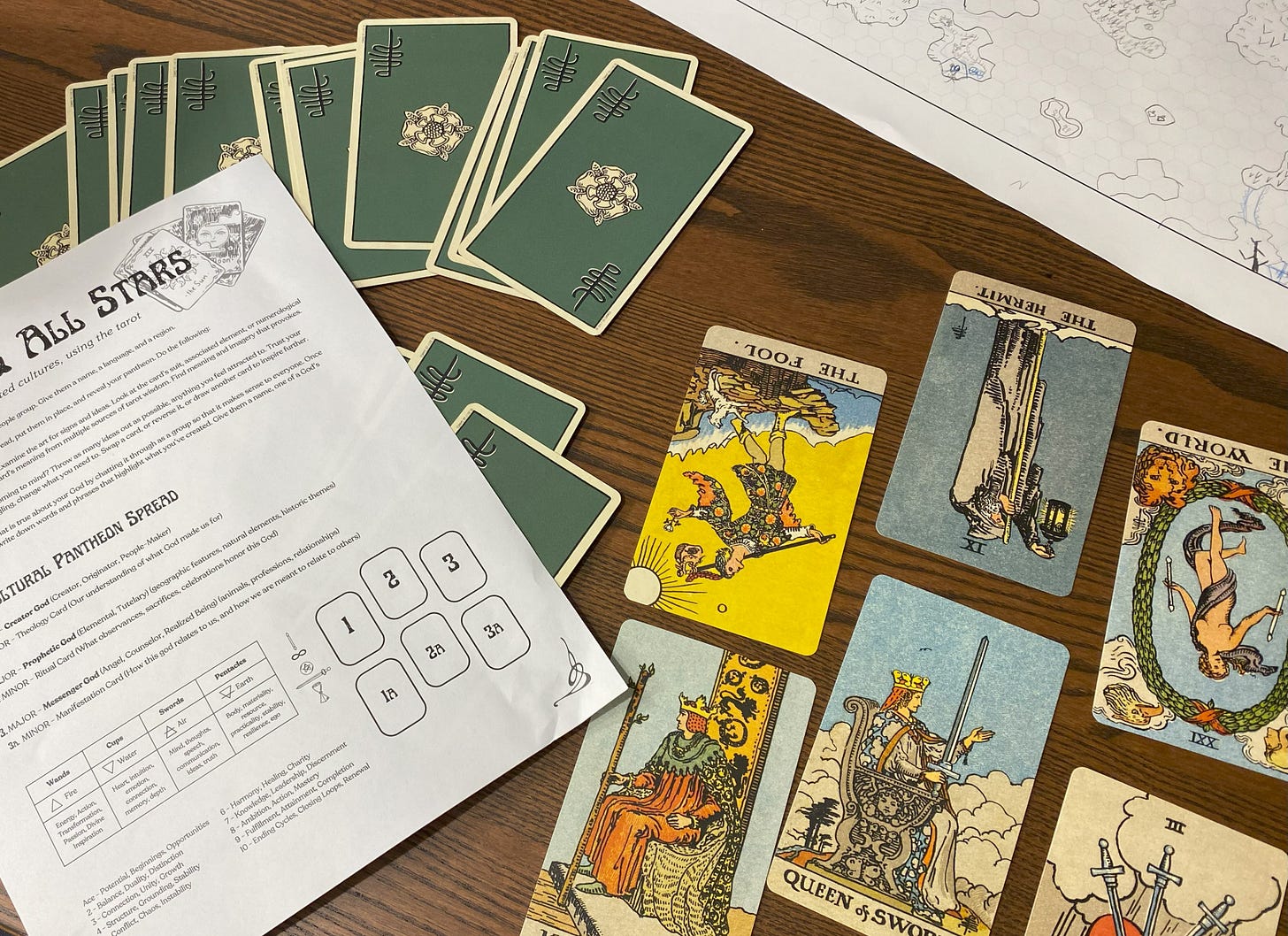Simple processes for making gods and divinities for your TTRPG setting
Yet another tarot-driven RPG process.
There is simply no better way to open a new campaign than with collaborative worldbuilding. My home group is playing lots of collaborative worldbuilding games to establish the setting for an upcoming campaign.
But the worlds we’re making have a hole in them: Gods.
We’re a table of all faith backgrounds, some steady in their faith life, some recovering, some totally allergic. But we all agree: There is a symbiotic and reciprocal relationship between the social culture of a society and that societies theology, ritual practice, and sacred stories about origin and purpose. Gods are rooted to landmarks, to favored relationships, animals, trades, practices and purposes, and where cultures collide, Gods meet and often mix.
A Simple Process for Pantheon-Making
I love processes, those elder cousins of what we call “mechanics.” As we develop cultures and people-groups for a fantasy campaign, I started longing for a procedure for quickly sketching out a pantheon. So I decided to make one!
Although there is a glut of tarot-driven TTRPG games available, I think tarot is a great oracle and resource for building a small pantheon for a particular culture or tribe of people. Tarot is typically laid out in “spreads,” a schema for laying down cards in a particular order or arrangement in order to drive interpretation.
Below, here is a simple process, using a single, three God spread. It takes only a few minutes. I’m calling it Earth & All Stars.
Not sure how tarot works, generally? That’s ok, everything you need is below! Let me know how it looks, perhaps I’ll build it out into several spreads, or an entire zine. Maybe it could use some oracles and random tables!
Begin with a culture, a tribe, or a people group. Give them a name, a language, and a region. Divide the cards into the major and minor arcana, and shuffle each.
Draw cards according to the spread, put them in place, and reveal your pantheon. Do the following:
Inspire - Consider the card. Examine the art for signs and ideas. Look at the card’s suit, associated element, or numerological significance. Research the card’s meaning from multiple sources of tarot wisdom. Find meaning and imagery that provokes.
Intuit - What ideas are coming to mind? Throw as many ideas out as possible, anything you feel attracted to. Trust your instincts. If you’re struggling, change what you need to. Swap a card, or reverse it, or draw another card to inspire further.
Interpret - Decide what is true about your God by chatting it through as a group so that it makes sense to everyone. Once you’ve got the idea, write down words and phrases that highlight what you’ve created. Give them a name, one of a God’s many names.
Cultural Pantheon Spread
MAJOR - Creator God (Creator, Originator, People-Maker)
MINOR - Theology Card (Our understanding of what God made us for)
MAJOR - Prophetic God (Elemental, Tutelary) Associated with: Geographic features, Natural Elements, Major Events, Historic Themes, Cultural Values
MINOR - Ritual Card (What observances, sacrifices, celebrations honor this God)
MAJOR - Messenger God (Angel, Counselor, Realized Being) Associated with: Animals, Trades, Relationships
MINOR - Manifestation Card (How this god relates to us, and how we are meant to relate to others)
Other notes:
I’ve been playtesting some of of Jason Lutes’ worldbuilding games, and I can’t wait for them to drop so I can tell you about Worldwizard. I really believe that when this thing drops someday, it’s going to be the new standard in fantasy worldbuilding games.
I’m absolutely loving the TTRPG blogging that’s happening where people are bringing it the practices of facilitation and group brainstorming (
), mindfulness and brain science (). And boy, that YouTuber Man Alone is developing quite the following. Almost enough to make a gal jealous. Maybe I’ll have to return to the platform.
I’m about to publish the Feast, a short quest/adventure for Follow, inspired by movies like Babette's Feast, Pig (2021), Phantom Thread, the Redwall books, and other great feast media. I want to write an accompanying diatribe on “cozy” media first, though, so diatribe incoming.
This episode of the Yes Indie’d Podcast has three South Asian creators of TTRPGs in just about the best, most intelligent, emotionally open, self-responsible, expansive conservation I’ve ever heard on the topic of TTRPG Orientalism, cultural authority, and worldbuilding as self-expression I’ve ever heard. A must-listen:







I love the spread and your instructions! Thank you for the mention!
Looks cool! I've been wanting to get more into Tarot. Will definitely try it out.